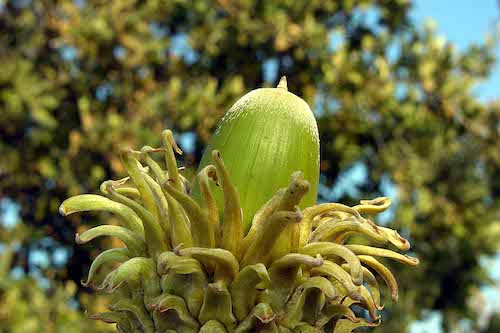A Valonia acorn
This summer does not want to say goodbye; yet nature is preparing for autumn. Slowly leaves are colouring, leaves are falling, crackling under your feet. When I was a little girl, my father used to take me along shady roads where majestic oak trees rained yellow leaves, and where acorns fell, their shiny corpses smiling at you from the wet ground. I took plenty of them home, to transform them with matchsticks into little dolls.
Here and there I still pick up an acorn (everywhere on the island there are some oak trees), then I stand there with an acorn in the hand, not knowing what to do with it. In Korea they make acorn jelly: dotori-muk. This takes a lot of patience, because acorn contains tannin that first must be removed by soaking. I am amazed that there would be any taste left then.
The nymph Circe had been banished by her father to an island. When Odysseus and his men moored there, she changed the crew into swines and fed them acorns. In this way she could better enjoy the presence of Odysseus who took years to find his way back home after the Trojan war. But that is a myth. Later acorns were ground into flour to bake bread. Nowadays there is acorn coffee. But I prefer chestnuts, or other nuts that hundreds of years ago replaced acorns on the list of staple food.
Nowadays oak trees stand useless in the landscape. Even though they give shadow and are beautifully green. It is the tree of Zeus, but nobody knows anymore how to communicate with this god through the rustling leaves of the oak, or to see the future this way (as once happened before temples took over the art of oracles).
At the end of the Nineteenth century Lesvos had a booming international trade in various products. In one year (1889 – 1890) France bought wine for 117,000 French francs; raisins for 100,000 francs; ‘vallonée’ for 70,000 francs; olive oil for 56,000 francs; leather for 27,000 francs and dried figs for 3000 francs.
At first I didn’t understand the use of the French word vallonée, meaning hilly: something you cannot export. I finally figured out that it came from the Valonia Oak (Quercus ithaburensis ssp.macrolepis) and it is the name for the heads of the acorns. There are plenty of Valonia Oaks on Lesvos, just like on the little island Kea, from which boats full of harvested acorn heads were sent to Lesvos.
The heads of the Valonia acorns look like charming balls made of curved, fancy flower leaves. That’s why I used to call this tree a Chrysanthemum tree. The big heads contain plenty of tannin, ideal for tanneries. This way oak tree bark and acorn heads helped to transform the stiff animal skins into supple leather. That was until the tanners were seduced by chemicals and the oaks, their bark and their acorns were made redundant
You can find different kind of oak trees on Lesvos. They were once also used as suppliers of shade for village vegetable gardens. After the Second World War, when there was a lot of poverty on the island, the several periods of emigration left those gardens untended: nobody left to defend the oak trees. Like against the sheep and goat farming, that was taken up especially in the west, due to large subsidies and abandoned acres and terraces. Some crops eaten by sheep and goats can return easily; however the oak does not belong to that category. In the western landscape of Lesvos (that additionally suffered from logging for shipbuilding) all the oaks have now literary been eaten and thanks to that and the overgrazing, it looks like a moonscape.
Lesvos has to take more care of its trees — like the chestnut trees, that several years ago became ill. Now that the chestnut forest has been saved, it is the enormous common pine shoot beetle (Tomicus piniperda) that is attacking the pine forests. I also hear of dying palm trees and I see a continuous dying of almond trees (don’t know why).
The now more-or-less treeless west never did protect its disappearing trees, most of them oak trees. Even though the huge empty landscape does have its charm, it can also be dangerous.
Because of the earth warming up, the island becomes more and more dry: the desertification moving quickly from the south-west to the north. The oak trees are just one example of what can disappear. Even though they have no economic value, it won’t be nice to promote to tourists an island looking as bare as the moon. Trees should be better protected. There should be stricter rules about the number of those sheep and goats devouring the island. Zeus should take some action to protect his trees.











